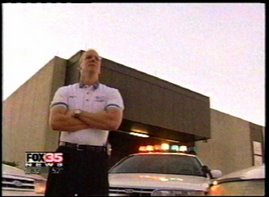
Many Americans woke up this morning (Sunday) to the news that a bombing situation had been thwarted in a high profile hub of our nation: New York City's Times Square. They also awoke to see pictures of hundreds of thousands of people participating in rallies protesting the Immigration law (and it's slightly altered current incarnation) in Arizona. As a former deputy sheriff who worked on the border (as pictured above) and a former police chief, I see that both deal with ideas that go the very heart of who we are as a people and what ideals our country stands for.
DICTATORSHIP POLICING EASY
It is easy to police in a dictatorship. Sadam Hussein was able to keep murderous, warring factions of Iraq in check by being more murderous than those groups. At the other end of the spectrum, The anarchy that is Somalia has no central government or ability to speak of to keep the various local warlords in check.
The United States has long struggled with governmental control and it's most visible component is that of law enforcement. Policing in a democratic society is hard as is evidenced by the events of the past few days in Times Square and in Arizona.
In general, I do not believe that we should sacrifice our ideals in order to be safer. In the words of U2 lead singer Bono (I know he is not the biggest philosopher around, but his thought here is true): "We do not need to become a monster, in order to defeat a monster."
ALERTNESS
What saved the day in New York City was the vigilance of a civilian street vendor. This veteran took a moment to notice an unusual situation and reported to a mounted New York City Police officer. The officer in turned notified his chain of command and the NYPD Bomb Squad and NYC FBI field office bomb techs responded. The system worked there thanks to the alert observation and good law enforcement response.
In Arizona, police intervention could go too far in a situation which is really larger and more political in nature (My earlier blog post on Blogger and my interview with Alternet.org goes into more detail). If the police go with the Arizona scenario, we have started to move down the slippery slope that personified our country's treatment of the Japanese during World War II., as well as the Nazis. The solution needs to come from Washington, DC, so as to preserve our localized, democratic style of policing.
Having the police pull double-duty stretches already thin resources, opens fiscally-strapped local governments up to lawsuits whether they enforce the new law or not, and will propel crimes towards non-illegals as Hispanic victims and witnesses will be intimidated and not help the police stop predators. Those predators will also victimize non-illegals. The predator illegals that are here will not be scared by this; only the non-violent illegal aliens will be wary of the law and police.
In this country, many officers have observed that people always want the laws enforced- as long as it is not against them. For example, all across the country, officers have agreed with my own experience having run radar in residential subdivisions in response to community outcry. The biggest offenders end up being the residents themselves and then they are not so happy to have that enforcement presence. Officers reading this can relate to it in their own policing experiences.
Even has a member of the police community, I have always been a staunch defender of the protections, rights, and even technicalities of our society. As I have said before, "It is those rights that protect you, me, my wife, and my son." I want a government that is strong enough to protect us, but not strong enough to move away from its democratic principles.
Much like the scales of justice, we must balance police and the power of the government enforcers in the middle. To much movement in either direction turns into the dictatorship of old Iraq or the anarchy of Somalia. We don't want to be either country. We are the United States of America and all the ideals that it stands for.
Sunday, May 2, 2010
Times Square Bomb & Arizona Immigration: Balancing Policing in A Democratic Society
Labels: Arizona, bomb, Dictatorship, Illiegal, Immigration, NYC, police, Richard Weinblatt, Times Square
Tuesday, April 27, 2010
Arizona Illegal Immigrant Law Bad Policing

In the furor that has followed the signing of the Arizona illegal immigrant law by Governor Jan Brewer and supported by Maricopa County Sheriff Joe Arpaio (creator of the famed tent city jail and the self-proclaimed "Toughest Sheriff in America"), few have stopped to look at the effect it has on policing. In a word it is bad.
I come at this perspective after having served as a deputy sheriff in a border state - New Mexico (I am in the picture above as a patrol deputy sheriff in rural New Mexico).
First I was in Dona Ana County (a 4,000 square mile county with 50 miles along the Mexican border) and then as a Patrol Division deputy sheriff II. with the Santa Fe County Sheriff's Office (a 2,500 square mile state capital county). I also served as a police chief in North Carolina and as an educator of law enforcers. I have worked for many years providing police services for legal and illegal immigrant populations.
Above: With fellow deputy sheriff in New Mexico.
And that's the key here, folks. The police provide police services. And we provide it to all. And we do it in a challenging economic, fiscally austerity-laden governmental structure. The Arizona law sets policing back many years.
BAD COMMUNITY RELATIONS
First off, the police rely on information. If you mandate that they investigate and arrest a very vulnerable population, those folks won't come forward with information. I would have thought that in policing a democratic society, we moved beyond intimidating the victim. We want to encourage victims to come forward with information.
As a police chief in North Carolina, I had a program where I spoke in uniform at churches all around the city in an effort to reach out to the community. I stopped my unmarked Ford Crown Victoria one day at a church that served Hispanics. They scattered afraid that I would try to deport them (under the Arizona law, deportation would happen only after a possible jail sentence and fine). I convinced the pastor that I wanted to reach out to their community and that they were deserving of the police's protective service also.
I spoke that Friday night (speaking some Spanish and some translated) and started to get more and more information from the good folks in that church. First it was little nuggets of information to test if I was trustworthy. Little by little the information got bigger. It crossed into items that effected the immigrants' legal neighbors. So the issues touched all and their information helped the entire community.
If nothing else, it is important to understand that easy victims are the first step for predators. They then become emboldened to prey on the legal residents of our nation. Crime and quality of life concerns do not know borders within our communities.
RACIAL PROFILING
I respectfully disagree with Sheriff Arpaio's interpretation of the mandate to investigate and detain upon a finding of reasonable suspicion concerning legal resident status. Sheriff Arpaio says that it is not racial profiling. I disagree. Having had to compile reasonable suspicion while investigating crimes, I can see how police officers and deputy sheriffs would have no choice. Any person who appears to be of darker color with an accent would have to have those facts as part of the reasonable suspicion building blocks.
Given the current scenario, people who have some of the "building blocks" (dark skin, accent) will be stopped repeatedly and questioned. That is more akin to a police state. We should not sacrifice what has made our country great to have an appearance of action.
The reasonable suspicion part of this will be legally challenged and officers will be confused as to how they can investigate without running afoul of legal issues. This is not as simple as the public thinks and officers cannot just move from the police-person consensual encounter to reasonable suspicion on flimsy information.
BURDEN TO SYSTEM
Sheriff Arpaio and others have contended that they run white people as well through the system. I disagree with that position from several angles. We need to have discretion as to who you run through the system to check for warrants and other information.
I know some agencies and officers have departmental or personal policies that call for running every person they come in contact with. That is not always advisable or feasible. Once the arrest warrant comes through, or the officer decides to make a lower priority arrest, he or she is tied up and is unable to handle higher level calls and assist other officers. The officer has no choice and has to follow the court ordered arrest warrant or, as in this case, the mandated detention of the illegal alien. Some agencies are too busy handling 911 calls for police service to be tied up handling smaller warrants or illegal alien investigations.
VICTIMIZING THE VICTIM
Worse yet, making arrests will have a chilling effect on victims. They will be afraid to come forward. This is something that we are already battling against and the law sets us way back.
The most vulnerable of victims, women and children, will suffer the most under this law. Domestic violence investigations is one area that has truly been dealt a blow now. Few victims will have the courage or trust that they need to overcome often brutal psychological, emotional, and physical abuse.
As a uniformed patrol officer in New Mexico, I had to repeatedly assure people that I was not Immigration or the Border Patrol. That I was not interested in their status, but rather in their safety. It was hard to gain their trust. This law shatters that trust for officers with boots in the dirt trying to gain information.
In my own experience as a uniformed peace officer, I often chose not to run someone who came to me as a victim as I knew arresting them would not be in the interest of justice. If I knew of the existence of an arrest warrant, that was different. But I certainly did not go out of my way to traumatize someone who already had come forward to me as a law enforcement officer. Sometimes at great personal peril.
UNFUNDED MANDATE
This is an unfunded mandate to already fiscally strapped counties and municipalities. Arresting, charging, and jailing a person is not cheap. Law enforcement can barely keep up with what they need to do for public safety, let alone this requirement that does not give the needed dollars to make it a realistic financial picture. This law does not just call for the turning over of illegal aliens to the feds for deportation. An entire investigation and prosecution has to take place, along with the expensive jailing of the accused, which has a jail sentence and fine attached to it. Only later does the possibility of deportation come up. And the federal government may nullify this by refusing to take the person.
This law, while an attempt to keep America whole, is blatantly un-American. It undermines many of the principles that we are founded on and places the police and county sheriff's offices in an untenable position. It is at odds with our mission to gain the trust and cooperation of our democratic society. Without that trust, the most vulnerable victims, and our ideals, will suffer.
Labels: Arizona, Arpaio, Brewer, Domestic, Enforcement, Immigrant, Immigration, Law, Richard Weinblatt, Victims, Violence





































